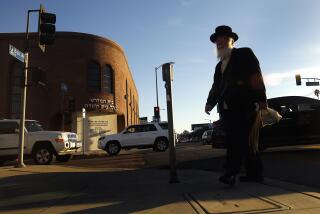Ramadan Offers a Time for Thanks but Also Resolve
- Share via
As metropolitan Los Angeles’ estimated 500,000 American Muslims began to mark the holy month of Ramadan last week, they joined many of the world’s 1.2 billion Muslims on an annual journey of heightened spiritual awareness consisting of dawn-to-dusk fasting, special communal prayers, reading the Koran and giving to the poor.
Ramadan celebrates the revelation of the Koran, Islam’s holy book, to the prophet Muhammad.
This year, Ramadan, Hanukkah and Christmas all overlap in a rare convergence of the major holidays of the three great monotheistic faiths.
While performing their spiritual obligations, Southern California Muslims will also have ample time to reflect on both the collective advances their community has made in the past year and the challenges that remain.
This year, with Ramadan also coming on the heels of Thanksgiving, American Muslims have much to be thankful for. Mosques are springing up in virtually every major American city as well as many smaller bedroom communities across the country.
In greater Los Angeles there are 60 mosques, with three opening within the last year. Currently, an $8-million project is underway to replace the area’s largest mosque, the Islamic Society of Orange County in Garden Grove.
Islamic schools and community service organizations are flourishing. Ground has been broken in Irvine for the New Horizon School, designed to meet the spiraling local demand for Islamic educational institutions. Muslim outreach programs are being developed in such diverse locations as universities, prisons, and tough inner-city neighborhoods.
American Muslims are also increasingly active on the political stage. After a successful nationwide voter registration drive during the 2000 election cycle, American Muslims flocked to the polls in record numbers in local, state and national elections.
Most recently, the U.S. Postal Service announced the issuance of the first-ever postage stamp commemorating the Muslim holidays that mark the end of Ramadan and the Hajj (the annual pilgrimage to Mecca) season.
As one of our nation’s fastest growing religions, Islam is finally beginning to gain recognition and understanding, prerequisites to a slow but inexorable acceptance into the collective woven fabric of mainstream American society.
In addition to establishing and strengthening Muslim institutions and places of worship, American Muslims have been gaining important victories in their ongoing struggle against discrimination.
Grass-roots American Muslim civil rights and advocacy groups have worked tirelessly to promote a positive image of their much-maligned and misunderstood faith.
In schools, while many textbooks still contain inaccurate descriptions of Islam and Muslim history, the efforts of such groups as the locally based Council on Islamic Education to combat such distortions are increasingly bearing fruit.
Now older textbooks containing offensive material are being replaced with accurate and positive depictions of Muslims and Islamic contributions in such fields as science, medicine, mathematics and architecture.
In addition to course material on Christmas, Hanukkah, Passover and Kwanzaa, schoolchildren are beginning to learn about Ramadan, Hajj and the major Islamic Eids (holidays).
In the workplace, incidents of discrimination against Muslim workers or job applicants are increasingly being challenged. Muslims targeted for such infractions as wearing hijab (the Islamic head covering for women), having a beard, or requesting time to perform prescribed daily prayers are today more vocal about asserting their rights.
The past year has seen numerous successful challenges to discriminatory workplace practices. In addition to these achievements, American Muslims realize that formidable challenges continue to confront their community.
Inexcusable Hollywood stereotypes of Muslims and Arabs as bloodthirsty terrorists persist, with “Rules of Engagement” earning the dubious award of “Most Islamophobic” film of this year.
Also, American Muslims locally and nationally continue to be the targets of hate crimes that invariably accompany paroxysms of violence in the Middle East. In the past month alone, the Islamic Center of Southern California in Los Angeles has been attacked by vandals on three separate occasions, and a prominent community leader has been targeted by a vicious Internet hate campaign.
On a positive note, a white supremacist was recently convicted and sentenced to prison for committing a hate crime against a Muslim man in California.
In President Clinton’s annual message to American Muslims on the occasion of Ramadan, he notes that “as America’s 6-million-member Muslim community grows in numbers and prominence, Americans of every religious tradition are learning more about the origins and meaning of Islam.”
He goes on to state that “we welcome Islam in America. It enriches our country with Islam’s teachings of self-discipline, compassion and commitment to family. It deepens America’s respect for Muslims here at home and around the world.”
We hope that President Clinton’s message will inspire our fellow Americans to seek a deeper understanding of our faith during this holy month and the upcoming year.
On Faith is a forum for Orange County clergy and others to offer their views on religious topics of general interest. Submissions, which will be published at the discretion of The Times and are subject to editing, should be delivered to Orange County religion page editor William Lobdell.
More to Read
Sign up for Essential California
The most important California stories and recommendations in your inbox every morning.
You may occasionally receive promotional content from the Los Angeles Times.













